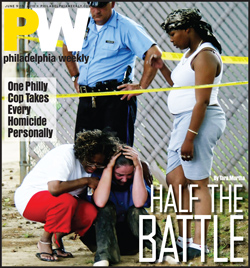 BY DAVE ALLEN Like time, news waits for no man. Keeping up with the funny papers has always been an all-day job, even in the pre-Internets era. These days, however, it’s a two-man job. That’s right, these days you need someone to do your reading for you, or risk falling hopelessly behind and, as a result, increasing your chances of dying lonely and somewhat bitter. That’s why every week PAPERBOY does your alt-weekly reading for you. We pore over those time-consuming cover stories and give you the takeaway, suss out the cover art, warn you off the ink-wasters and steer you towards the gooey center. Why? Because we love you!
BY DAVE ALLEN Like time, news waits for no man. Keeping up with the funny papers has always been an all-day job, even in the pre-Internets era. These days, however, it’s a two-man job. That’s right, these days you need someone to do your reading for you, or risk falling hopelessly behind and, as a result, increasing your chances of dying lonely and somewhat bitter. That’s why every week PAPERBOY does your alt-weekly reading for you. We pore over those time-consuming cover stories and give you the takeaway, suss out the cover art, warn you off the ink-wasters and steer you towards the gooey center. Why? Because we love you!
ON THE COVER
CP: Another indispensable piece of reporting from Isaiah Thompson on exploitative housing practices in one of the city’s most problematic and volatile neighborhoods. It carries a somewhat-sensational headline — using “dropped a bomb,” not long after the MOVE anniversary, is questionable, and the vacant lot at the right-hand of the cover images looks like it could have been cleared with explosives — but that doesn’t take away from Thompson’s findings on Robert Coyle and his damaging wheelings and dealings in Kensington.
For decades, Coyle, now in his mid-60s, was a well-known Kensington realtor who sold real estate with at least one of his sons, Robert Jr., and, at one time or another, employed many of the neighborhood’s plumbers and tradesmen to work on his properties. His early companies, Robert N.  Coyle Sr. & Sons Real Estate Inc. and Apple Development Corp., operated almost exclusively in Kensington and northwestern Port Richmond throughout the 1990s and 2000s. They often bought properties from those leaving the neighborhood and sold or rented them to newcomers.
Coyle Sr. & Sons Real Estate Inc. and Apple Development Corp., operated almost exclusively in Kensington and northwestern Port Richmond throughout the 1990s and 2000s. They often bought properties from those leaving the neighborhood and sold or rented them to newcomers.
It was, demographically speaking, a brilliant business model. White, middle-class families who had been sustained for generations by factory jobs were leaving in droves; low- and middle-income Hispanics who needed affordable housing were moving in. Coyle bought houses from McBrides, Sloans and Myerses and sold them to Felicianos, Colons and Lopezes.
For much of his career, these transactions were straightforward: Coyle bought for less and sold, or rented, for more. But in the mid-’90s, his business model began to change in a profound way. This change coincided with the rise of the housing bubble, as banks came to see property not as actual houses with actual people paying actual mortgages, but as abstract commodities to be sliced and sold — commodities that, the thinking went, could only increase in value.
PW: An interesting look at Kathryn Battle, the PPD officer in charge of notifying the families of homicide victims. The toll of the job comes across, though Battle remains upbeat, though determined and resolute.
 When a job comes in, a well-honed machine whirs to life: One team of detectives dashes to the scene, another heads to the hospital. The body is identified and the family notified in person—often just a formality, since neighborhood residents usually know who was murdered before police do. From then on, who the victim was when alive is reduced to statistics—age, race, sex—and the body now evidence of its own demise.
When a job comes in, a well-honed machine whirs to life: One team of detectives dashes to the scene, another heads to the hospital. The body is identified and the family notified in person—often just a formality, since neighborhood residents usually know who was murdered before police do. From then on, who the victim was when alive is reduced to statistics—age, race, sex—and the body now evidence of its own demise.
It’ll be cut open and analyzed for clues. In a shooting, hands will be bagged and checked for DNA and gun powder. Detectives need to stay focused on the facts and the clues, and not get overwhelmed by the grief of it all. They leave that part to Officer Kathryn Battle.
Back at the office, Battle works an angle of the case that won’t be covered in the next day’s news. While detectives chase hot leads, it’s Battle’s job to deliver condolences and cold comfort to the murder victim’s family.Within 48 hours, though usually the next morning, Battle makes calls to the bereaved. Over the next few days and sometimes, years, she will be the face of the PPD to the family, acting as an adviser, counselor, companion and advocate, depending on the situation. But first she has to make the dreaded call.
Tara Murtha ably highlights the demands of Battle’s job, the reactions of the people she must inform, and the systemic tensions between crime-riddled neighborhoods and the police charged with serving and protecting them. Battle is the center, of course, with the sketches of the neighborhoods around her — especially the ones she visits most frequently — coloring the difficulty of her task.
INSIDE THE BOOK
CP: Widespread Cornbread. Open wide for some soccer (I’m the third type of fan, not calling it “football”). Evil + smart = dangerous. Fracking = not related to Battlestar Galactica.
PW: Philly in joy and in sorrow. Barnes behind bars: the saga continues. Mexican food so authentic it would have to show papers in Arizona. True story: I have been to the amusement park where the “wrong gig” drummer performed.
WINNER: Strong cover stories on both sides this week, but the “wrong gig drummer” interview cinches the victory for PW. What a trip.
